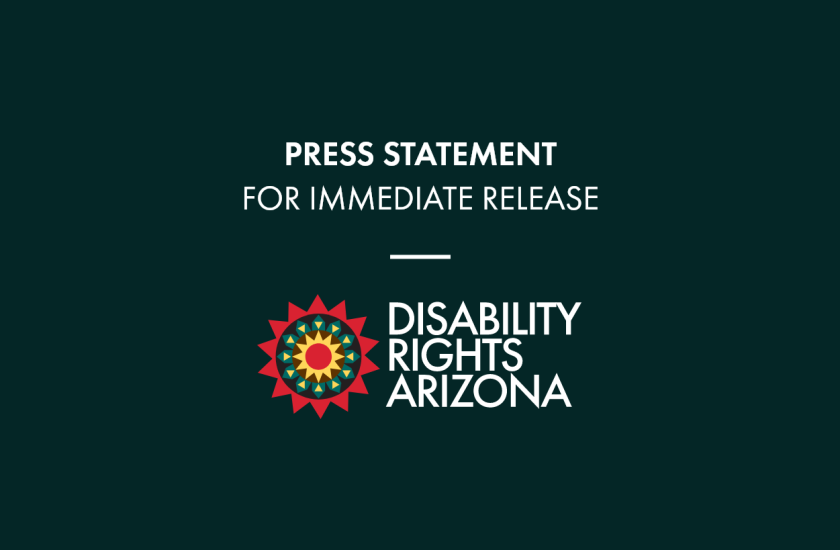The Disability Rights Arizona (DRAZ), along with The Arc of Arizona, Arizona Association of Providers for People with Disabilities, Arizona Center for Law in the Public Interest, ACLU of Arizona and numerous advocacy and civil rights organizations, sent a letter to Governor Ducey expressing serious concerns about the potential impact of the state’s Crisis Standards of Care Plan (CSC) on vulnerable and at-risk populations within the state – impacts that could result in discriminatory denial of life-saving healthcare during the COVID-19 pandemic.
The CSC outlines how and to whom limited healthcare resources are to be allocated in the event of a crisis, such as a pandemic or natural disaster. Also addressed in the letter were Arizona Department of Health Services (ADHS) Director Cara Christ, AHCCCS Director Jami Snyder, and Division of Developmental Disabilities Acting Assistant Director Zane Garcia Ramadan.
As Arizona is currently experiencing a rise in COVID-19 cases across the state, this situation has required utilization of the contingency level of the State’s Crisis Standards of Care Guidelines. The COVID-19 virus could soon lead to the rationing of medical staff, equipment, and supplies, so clear guidance to health care facilities and homes must be provided now. In recent weeks, nearly a dozen similar plans in states across the U.S. have been significantly revised to ensure protections for vulnerable populations such as those identified in this letter to the State of Arizona.
Earlier this year, DRAZ wrote a letter to ADHS and urged the Department to modify CSC guidelines to incorporate explicit nondiscrimination requirements and provide for reasonable accommodations for persons with disabilities. However, the revised guidelines did not incorporate these changes, nor did DRAZ receive a response.
Persons with disabilities, communities of color, and older adults – all of whom are at high risk of infection and death from COVID-19, all of whom have historically experienced broad discrimination, and all of whom have been disproportionately impacted by the pandemic – need clear and specific protections to be listed in Arizona’s CSC guidelines, especially during this pandemic.
“Discrimination against people with disabilities, older people, and people of color were acceptable and widespread in the past, and such discrimination continues to happen today,” said J.J. Rico, CEO of DRAZ, “and just like with other civil rights laws, we need to be explicit in the Crisis Standards of Care about protections to ensure discrimination does not happen here.”
The letter requested the CSC guidelines be revised to:
- Prohibit making healthcare decisions based on disability, perceived quality of life, age, underlying conditions and a person’s need for disability-related accommodations.
- Delete the words “disability unrelated to prognosis,” since this broad concept encompasses a wide range of disabilities that are unrelated to immediate survival from COVID-19.
- Provide necessary accommodations and/or auxiliary aids and services to assist persons with communication, mobility, or other conditions to effectively participate in healthcare treatment decisions.
- Require modifications to be made to any standardized scoring instruments in order to accommodate specific disabilities or underlying conditions and reflect an objective assessment of immediate short-term survival.
- Prohibit the use of medical or social resources after discharge as a factor in decision-making if the person needed those resources prior to treatment.
- Require that those on a ventilator on a regular basis (not related to COVID-19) be allowed to retain their ventilator, and not have it removed or reallocated to other persons.
DRAZ, The Arc, The Arizona Center for Law in the Public Interest, and other advocates are asking ADHS to immediately revise the CSC and ensure that the State’s guidance to healthcare personnel and facilities lives up to the state’s commitment to protecting all Arizona residents, including people with disabilities, those from communities of color, and older adults.
A copy of the letter can be found HERE.

